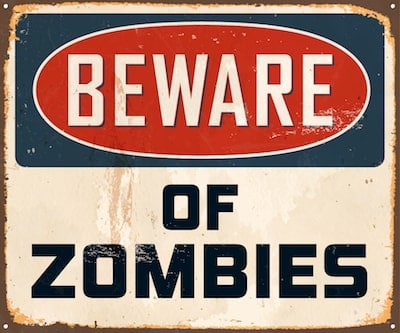Beware of Zombie Websites and Fraudulent Digital Ripoff
 It’s tough attracting new patients. And just when you thought you only had to worry about ransomware, phishing scams, phony charities and the desperate email from a Nigerian prince…along comes a big-time advertiser swindle. “Zombie websites” amount to a rapid-fire digital fraud that has picked the pockets of some of the nation’s biggest brands. Hershey’s, Johnson & Johnson, Ford, and MGM are among the familiar names.
It’s tough attracting new patients. And just when you thought you only had to worry about ransomware, phishing scams, phony charities and the desperate email from a Nigerian prince…along comes a big-time advertiser swindle. “Zombie websites” amount to a rapid-fire digital fraud that has picked the pockets of some of the nation’s biggest brands. Hershey’s, Johnson & Johnson, Ford, and MGM are among the familiar names.
A recent investigative report by BuzzFeed News—Attack of the Zombie Websites—provides the intricate background and the reason for concern. Although there’s no immediate risk for advertisers (outside of the brand giants), things move quickly in the computer world. It only makes good sense to be informed and alert. Reading from the topline, you should know:
- Be aware, but not alarmed…yet. Only giant brand advertisers are the primary victims.
- Programmatic ad buying is the risk. Click/impression ad fraud takes advantage of the sweeping advertising buys that are computer-program originated.
- Regular advertisers have safeguards. Non-programmatic accounts can be protected.
- This zombie scam doesn’t work the “ordinary” advertiser level. Be informed.
Here’s how “zombie” digital fraud hurts advertisers…
The term “zombie website” labels part of the intricate and fraudulent process. The scheme is super-sophisticated, but here’s a quick analogy.
More than one motion picture plot involves skimming a few cents from hundreds or thousands of accounts. As the plot turns, it seems nobody notices or cares about the missing fractions. But, before the curtain, it all adds up to millions. In some instances, it’s called “salami slicing” or “coin clipping.” It turns out that the zombie-fraud business is something similar.
Really big advertisers—the international brand name victims—buy their advertising using sophisticated computer programs. And they are charged for the impressions or clicks that occur by or from real people in the audience.
In this scheme, however, other (nefarious) computer programs redirects and displays the ads on what amounts to a series of phony websites, where they are not actually being viewed or clicked by real people—but the advertiser is charged. Special programming (also nefarious) triggers many supposed views and charges. It’s digital fraud when there are no actual customers or viewers in empty sites.
Beware big brand name advertisers…
For the most part, the programmatic ad buying of brand advertising sets up the click and impression ad fraud. Outside of the big brand/programmatic buying, a client’s online advertising maintains safeguards:
- Client campaigns are “real-people” monitored. “Human hands” design, direct and monitor the actual ad buys.
- Content exclusions specify where ads don’t fit. Advertising opts out of specific websites, so not to appear, for example, among “tragedy and conflict,” “games,” or “content not yet labeled.”
- Invalid clicks are not charged. In the event that advertising appears in the wrong place, there is no charge for an “invalid click.”
The best safeguard for hospitals, regional, and local advertisers is simply to be aware of the zombie risk. Obviously, there is no value in having your advertising appear on a phantom website where there is no click-through or actual audience.









